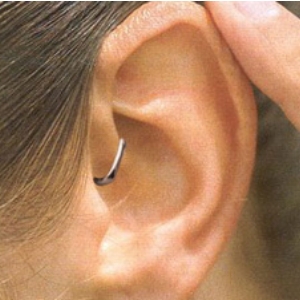
Now, updated expert guidelines stress that the condition is best managed by antibiotics or antibacterials given as eardrops rather than by antibiotics in pill form.
The panel at the American Academy of Otolaryngology – Head and Neck Surgery Foundation recommends that patients be treated with antibiotic eardrops, but only if necessary.
Pills ineffective
Swimmer's ear "may cause intense pain. Eardrops offer prompt relief, but about one-third of cases are treated with oral [pill] antibiotics, which are ineffective and promote resistant bacteria," Dr Richard Rosenfeld, who helped draft the new advisory, said in a statement provided by the academy.
"The updated guideline expands upon prior guidance with new clinical trials, new systematic reviews and consumer participation, intended to optimize the diagnosis and treatment of this common disorder," Rosenfeld said.
Swimmer's ear, formally known as "acute otitis externa", is an infection of the outer ear that generally occurs when water becomes trapped in the ear canal and bacteria multiply, the experts explain. The condition is very common and affects about one in every 123 Americans each year. Besides swimming, people can contract swimmer's ear through trauma to the ear, stress, sweat and allergies.
New guidelines
Symptoms can include swelling, itching, hearing loss and pain, especially when tugging on the earlobe or chewing on food.
The organization issued the new guidelines in the journal Otolaryngology – Head and Neck Surgery.
Treatments include painkillers and a variety of types of eardrops, including some that deliver antibiotics to the ear. The problem with pills, according to the foundation, is that they're simply ineffective. The major types of bacteria that cause swimmer's ear aren't vulnerable to oral antibiotics, they noted, and not enough antibiotic firepower makes its way to the ear canal.
The guidelines do, however, note that oral antibiotics may be appropriate in some cases, such as when an infection travels outside the ear canal. Prompt assessment of the patient's pain, and recommendations for painkillers are also advised.
Two experts welcomed the new guidelines.
Better outcomes
Dr Eric Smouha, director of otology and neurology at the Icahn School of Medicine at Mount Sinai in New York City, agreed that "oral or systemic antibiotics are rarely needed to treat this condition."
Another key recommendation, according to Smouha, is that cheaper antibacterial agents such as 2% acetic acid, and more expensive antimicrobial drops such as Ciprodex, seem to work equally well against swimmer's ear.
"For most clinicians, these guidelines will reinforce and confirm existing clinical practices, and for a few, they will lead to alterations in ingrained habits that result in better outcomes," Smouha said.
Dr David Hiltzik is director of otolaryngology and head & neck surgery at Staten Island University Hospital, also in New York City. He agreed with Smouha that the new guidelines "will have a large impact in the treatment of this very common disease. They provide a clear and concise diagnostic and treatment pathway for many physicians."
Read more: Ear infections




 Publications
Publications
 Partners
Partners











